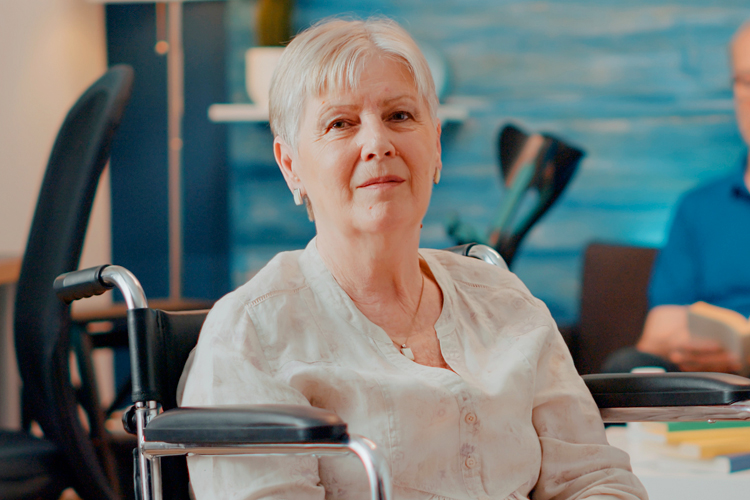When a loved one starts needing more help than can be managed at home, families often begin to wonder: who qualifies for assisted living? In Colorado, the answer is shaped by state regulations that define what assisted living communities can and cannot provide. At Cappella of Grand Junction, we walk alongside families to interpret those rules in everyday language and apply them through a compassionate assessment process.
What Is Assisted Living?
Assisted living is often described as the “in-between” option for older adults: more support than living alone at home, but not the round-the-clock medical care of a nursing home. It’s designed for people who still enjoy independence but need help with some of the tasks that make daily life safe and comfortable.
Typical services in an assisted living community include:
 Private or semi-private apartments for privacy and dignity
Private or semi-private apartments for privacy and dignity- Chef-planned meals with accommodations for dietary needs
- Assistance with personal care such as bathing, grooming, or medications
- Housekeeping and maintenance to reduce stress and fall risks
- Wellness programs, social events, and outings to support active living
- 24/7 staff for peace of mind and quick response
For context, the National Center for Assisted Living reports that more than one million older adults live in assisted living communities across the United States, reflecting just how common and valuable this care option has become.
When to Consider Assisted Living
Most families don’t make this decision all at once, it builds as daily life becomes more difficult or unsafe. Recognizing the signs early can help loved ones maintain independence while receiving the right support.
Common signs it may be time for assisted living:
 Medication routines are slipping or becoming confusing
Medication routines are slipping or becoming confusing- Daily personal care requires frequent hands-on help
- Skipped meals, poor nutrition, or unintentional weight loss
- Increased fall risk or unsafe conditions at home
- Chronic health conditions feel harder to manage alone
- Growing isolation or loneliness
- Family caregivers experiencing burnout
A quick self-check:
- Would daily assistance make life safer and less stressful?
- Would consistent meals, medication support, and social interaction improve well-being?
- Would a predictable routine and connection with peers bring peace of mind?
If the answer is “yes” to several of these, assisted living can be a caring next step, not a last resort.
What Qualifies an Older Adult for Assisted Living?
In Colorado, assisted living communities are licensed and regulated by the state. These rules set clear boundaries for the type of care that can be provided. At Cappella of Grand Junction, we use those standards to help families understand whether assisted living is the right fit.
When assisted living is usually a good fit
Older adults often qualify if their needs are steady and manageable within the services allowed by Colorado regulations. This typically includes:
 Personal care help with bathing, dressing, grooming, or toileting
Personal care help with bathing, dressing, grooming, or toileting- Household services like meals, laundry, and housekeeping
- Medication management for pills, inhalers, eye drops, or creams when schedules and doses are predictable
- Support for stable health conditions such as diabetes that can be managed with reminders and monitoring
- Mobility assistance with walkers, canes, or electric wheelchairs when the resident participates safely
- Light health oversight like vital sign checks or simple first-aid-level wound care
When assisted living may work with added support
Some needs may still be managed in assisted living settings under Colorado regulations through proper care coordination and collaboration with appropriate outside providers. This approach allows communities to evaluate each situation on a case-by-case basis and support residents through services such as:
 Transfer assistance and fall management
Transfer assistance and fall management- Insulin injection supervision
- Special diets or mealtime assistance
- Oxygen therapy at higher flow rates when permitted by safety codes
- Catheter or ostomy care coordinated with outside providers
- Early-stage pressure injuries that are stable and monitored
When assisted living is not the right fit
Colorado regulations set clear limits on what assisted living can provide. When care needs exceed those limits, memory support or skilled nursing is the safer choice.
Assisted living is not designed for residents who:
- Need 24-hour skilled nursing such as IV medications, ventilator, or tracheostomy care
- Have advanced wounds that require ongoing skilled treatment
- Cannot assist at all with transfers
- Live with severe cognitive decline that makes daily participation unsafe
- Experience behavioral or medical risks that compromise safety
Even if some tasks can be supported, assisted living may not be appropriate when conditions are rapidly changing or unpredictable. For example, advanced dementia with wandering or the need for around-the-clock supervision is better supported in a memory care neighborhood.
Understanding the BIMS Assessment
The Brief Interview for Mental Status (BIMS) is a short, 5–10 minute interview that helps communities understand a person’s memory, attention, and orientation. It is not a diagnosis and cannot be “passed” or “failed.” Instead, it informs care planning alongside health and mobility assessments.
BIMS scores range from 0 to 15. Higher numbers suggest fewer cognitive changes. Lower numbers suggest more support may be needed. Families often find it helpful to think of the results this way:
- 13–15 indicates intact cognition with little to no impairment.
- 8–12 points to noticeable changes. Assisted living can still work for some people, especially with a tailored care plan.
- 0–7 suggests significant memory and thinking changes. A secure memory support setting may provide better safety and success. Learn more about who qualifies for memory care.
At Cappella of Grand Junction, BIMS is combined with other assessments to help identify the safest and most supportive setting for each resident.
Assisted Living at Cappella of Grand Junction
 Every person’s journey is unique, and so is the care we provide. Our team takes time to learn each resident’s health history, daily routines, preferences, and goals. From there, we design a plan that balances independence with peace of mind, adjusting as needs change.
Every person’s journey is unique, and so is the care we provide. Our team takes time to learn each resident’s health history, daily routines, preferences, and goals. From there, we design a plan that balances independence with peace of mind, adjusting as needs change.
Residents live in comfortable private apartments with support available at any hour. Chef-planned meals make dining both enjoyable and accommodating for special diets. Caring team members lend a hand with personal care and medications, and a full calendar of wellness, enrichment, and social opportunities encourages connection and purpose. The spirit of the community is grounded in dignity and genuine relationships, so families feel welcome and informed.
When a higher level of support becomes the better fit, we guide families through the transition to memory support or other services with clarity and care, helping each person maintain continuity, routine, and a strong sense of belonging.
If you’re asking, “Who qualifies for assisted living?” and wondering what’s right for your loved one, our team at Cappella of Grand Junction is here to help. Schedule a tour today and see how our community supports older adults with care, connection, and peace of mind.

 Medication routines are slipping or becoming confusing
Medication routines are slipping or becoming confusing Personal care help with bathing, dressing, grooming, or toileting
Personal care help with bathing, dressing, grooming, or toileting Transfer assistance and fall management
Transfer assistance and fall management


